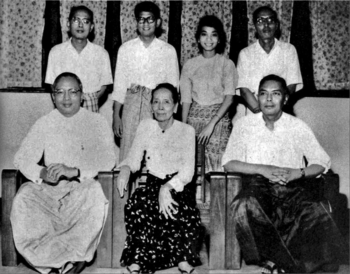U Thant
[θa̰ɰ̃]; 22 January 1909 – 25 November 1974), known honorifically as U Thant (/uː θɑːnt/),[a] was a Burmese diplomat and the third secretary-general of the United Nations from 1961 to 1971, the first non-Scandinavian as well as Asian to hold the position.
In the days of tense political climate in Burma, he held moderate views positioning himself between fervent nationalists and British loyalists.
In his first term, Thant facilitated negotiations between U.S. president John F. Kennedy and Soviet premier Nikita Khrushchev during the Cuban Missile Crisis of 1962, helping to avert a global catastrophe.
Thant, the eldest of four sons, was born in Pantanaw, Colonial Burma, to a moderately-wealthy family of landowners and rice merchants.
[4] Po Hnit had collected a personal library of various American and British books and cultivated a reading habit among his children.
[9] After the death of his father, Thant believed he would not be able to complete a four-year degree and instead worked for a two-year teaching certificate at Rangoon University in 1926.
Thant regularly contributed to several newspapers and magazines under the pen name "Thilawa" and translated a number of books, including one on the League of Nations.
[7] In the days of tense political climate in Burma, Thant stood moderate grounds between fervent nationalists and British loyalists.
When teaching the Japanese language was made compulsory in Pantanaw high schools, Thant defied the orders and cooperated with the growing anti-Japanese resistance.
Within two weeks, the United States and the Soviet Union had agreed to appoint Thant as the Acting Secretary-General for the remainder of Hammarskjöld's term.
[20] At a critical moment—when the nuclear powers seemed set on a collision course—the Secretary-General's intervention led to the diversion of the Soviet ships headed for Cuba and interception by our Navy.
In less than one year in office, Thant faced a critical challenge to defuse the Cuban Missile Crisis, the moment when the world came closest to a nuclear war.
On 20 October 1962, two days before public announcements were made, U.S. president John F. Kennedy showed Thant U-2 aerial reconnaissance photographs of Soviet missile installations in Cuba.
To avoid a naval confrontation, Thant proposed that the U.S. should make non-invasion guarantees in exchange for missile withdrawal from the Soviet Union.
Thant flew to Cuba and discussed with Fidel Castro allowing UN missile inspectors and the return of the body of the downed U-2 pilot.
Castro, furious that the Soviets had agreed to remove missiles without his knowledge, categorically rejected any UN inspectors, although he did return the pilot's body.
[30] For his role in defusing the Cuban crisis and other peacekeeping efforts, the Norwegian Permanent Representative of the United Nations informed Thant that he would be awarded the 1965 Nobel Peace Prize.
[33] After the Six-Day War, [Thant] allowed himself to become a convenient scapegoat for international inaction, accepting this unenviable role with as much Buddhist detachment as could be summoned.
[15] He was criticized in the US and Israel for agreeing to pull UNEF troops out of the Sinai in 1967 in response to a request from Egyptian president Gamal Abdel Nasser.
The UN afterwards stated, "Because Israel refused to accept UNEF on its territory, the Force had to be deployed only on the Egyptian side of the border, and thus its functioning was entirely contingent upon the consent of Egypt as the host country.
The 1971 United Nations Secretary-General selection was delayed by the anticipated arrival of the People's Republic of China, and the Security Council did not begin voting until two weeks before the end of Thant's term.
In 1961, when he was first appointed, the Soviet Union tried to insist on a troika formula of three secretaries-general, one representing each Cold War bloc, to maintain equality in the United Nations between the superpowers.
[15] In his farewell address to the United Nations General Assembly, Secretary-General Thant stated that he felt a "great sense of relief bordering on liberation" on relinquishing the "burdens of office".
[45][46] In an editorial published around 27 December 1971, praising Thant, The New York Times stated that "the wise counsel of this dedicated man of peace will still be needed after his retirement".
He spent the last years of his life writing and advocating the development of a true global community and other general themes he had tried to promote while he was secretary-general.
From the United Nations headquarters in New York where he was laid in state, Thant's body was flown back to Rangoon, but no guard of honour or high-ranking officials were on hand at the airport when the coffin arrived except for U Aung Tun, deputy minister of education, who was subsequently dismissed from office.
[51] On the day of Thant's funeral on 5 December 1974, tens of thousands of people lined the streets of Rangoon to pay their last respects.
[52] During the period of 5–11 December, the student demonstrators also built a temporary mausoleum for Thant on the grounds of the RUSU and gave anti-government speeches.
In early morning on 12 December 1974, government troops stormed the campus, killed some of the students guarding the makeshift mausoleum, removed Thant's coffin, and reburied it in Kandawmin Garden Mausolea near the Shwedagon Pagoda, where it has continued to lie.
When he was informed that the 1965 Nobel Prize would instead go to UNICEF due to Chairman Gunnar Jahn's veto, Thant, according to Walter Dorn, "recorded his pleasure".







